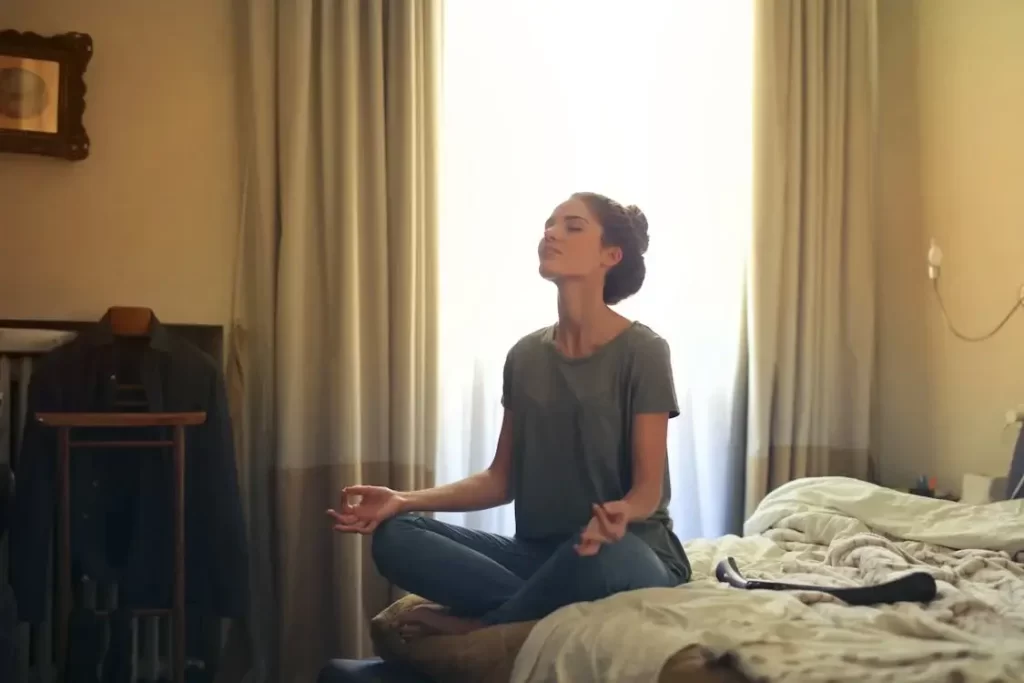By Alena Gerst, LCSW | Founder, Director, Psychotherapist
Anxiety is a universal human experience. It’s actually crucial to have the internal alarm system to help us navigate challenges and dangers.
However, when anxiety becomes chronic or overwhelming, it can be disruptive at best, and downright catastrophic for your wellbeing if left unchecked to grow. Anxiety therapy offers a structured and supportive space to address these challenges, as well as a safe regular space to talk about things going on with your “inside voice,” the thoughts that you wish would just go way forever.
One of the most common questions people ask when seeking therapy for anxiety is how long before you’re “cured.” This is not an easy question. The answer calls for a distinction between managing anxiety, and curing it, and explores how therapy for anxiety plays a pivotal role.
Understanding Anxiety
Anxiety disorders come in many forms, most commonly including generalized anxiety disorder (GAD), panic disorder, social anxiety disorder, and specific phobias, and obsessive compulsive disorder, among others. While occasional anxiety is a normal response to stress, chronic high level anxiety involves persistent and excessive fear or worry, to the point that it distracts and disrupts your daily life.
These disorders often manifest with physical symptoms, such as a racing heart, shortness of breath, trouble with sleep or changes in appetite, and chronic muscle tension, which can be distressing and debilitating.
Factors contributing to anxiety include genetics, brain chemistry, trauma, and environmental or relationship stressors. Therapy for anxiety aims to address these factors, depending on your most distressing symptoms and priorities, offering you the tools to reduce symptoms and improve your quality of life.
The Concept of Curing Anxiety
To cure anxiety would mean completely eliminating all symptoms and triggers, rendering you free of the condition. For some, especially if your anxiety stems from situational factors or specific events, this goal may be achievable. For example, if you are someone who experiences anxiety due to an upcoming event, such as an interview for a job, a public speaking event, or a big exam, when the event passes, your anxiety symptoms resolve (until the next event!).
However, for many people, anxiety is tied to broader patterns of thinking, feelings, and behaviors that cannot be entirely eliminated. Biological predispositions or chronic stressors can make anxiety a recurring challenge. In these cases, therapy for anxiety shifts its focus to management rather than cure, aiming to equip you with skills to navigate the waves of symptoms more effectively, with a greater sense of perspective, and a knowledge that you can and will persevere.

Managing Anxiety: A Practical Approach
Managing anxiety involves reducing its intensity and impact while building resilience. Anxiety therapy focuses on helping you add to your toolkit techniques to manage your symptoms in a sustainable way. This can look like challenging some of your more deeply held thinking patterns, and looking for changes in behaviors that will help too.
Some of the most effective therapeutic approaches include:
- Cognitive Behavioral Therapy (CBT): CBT is a cornerstone of therapy for anxiety, helping you identify and reframe negative thought patterns that perpetuate fear and worry. By changing how you perceive and respond to triggers, you can reduce the intensity of your anxiety.
- Mindfulness and Relaxation Techniques: Mindfulness-based approaches encourage you to focus on the present moment, reducing cycles of rumination. Practices such as deep breathing, progressive muscle relaxation, and guided meditation are often integrated into therapy for anxiety. Your therapist will help you find the practices that feel most accessible and effective for you. There are many ways to mindfulness.
- Exposure Therapy: For specific phobias, OCD or panic disorders, exposure therapy gradually introduces you to anxiety-provoking situations in a controlled way. Over time, this desensitization helps reduce the emotional response to triggers.
- Lifestyle Changes: Physical health and mental health are deeply interconnected. Incorporating regular exercise, improving sleep hygiene, and adopting a balanced diet can significantly impact anxiety levels.
- Stress Management Skills: Effective time management, setting boundaries, and prioritizing self-care can help alleviate external pressures that exacerbate anxiety.
Anxiety Therapy: A Lifelong Ally
Therapy for anxiety is not a one-size-fits-all solution. Each person’s experience with anxiety is unique, requiring a personalized approach. For some, short-term therapy might be sufficient to resolve specific issues. For others, therapy becomes a long-term ally, offering ongoing support to navigate life’s challenges.
A key benefit of anxiety therapy is the emphasis on self-awareness and self-compassion. Through therapy, you gain insights into your triggers and patterns, enabling you to make informed choices about your well-being. Additionally, therapy fosters a sense of empowerment, as you develop the skills needed to confront and manage your anxiety.
The Role of Medication in Managing Anxiety
What about medication?
While therapy is the cornerstone of managing anxiety, medication can play a complementary, and effective, role. For those with severe and chronic symptoms, medications can provide increased relief, enabling you to engage more fully in therapy.
For instance, if you are working with exposures, you may find that the discomfort is intolerable until you add medication. You will still feel uncomfortable with the exposures, but they can and do offer additional support. However, medication alone is not a cure for anxiety; it works best when combined with psychotherapy.
The Journey Toward Healing
The process of addressing anxiety—whether through management or seeking a cure, depending on the situation—requires patience and commitment. Progress is often nonlinear, with setbacks and breakthroughs along the way.
Therapy provides a safe and supportive space to navigate these fluctuations, helping you stay focused on your goals. And even during the times when you feel like you are losing hope, your therapist remains a steady presence, always optimistic about your growth.
So whether you are seeking to cure anxiety or manage it, the ultimate goal is to reduce its grip on your daily life. This might involve developing a toolbox of coping strategies, building supportive relationships, and fostering a lifestyle that promotes mental health. For those seeking a cure, therapy helps uncover and address the root causes of anxiety, offering the possibility of long-term relief.

Conclusion: Managing Anxiety vs. Curing It
The distinction between managing and curing anxiety is nuanced. For some, therapy for anxiety leads to a resolution of symptoms and a sense of being “cured.” For others, the focus shifts to managing the condition in a way that allows you to live a fulfilling and balanced life. Both paths are valid and valuable, depending on your needs and circumstances.
Anxiety therapy empowers you to take control of your mental health journey. By addressing the unique challenges of each person, therapy helps you move beyond the limitations of anxiety and embrace a life of resilience and growth.
Whether the goal is to manage or cure anxiety, we at Inside Psychotherapy are here to help you develop a roadmap to greater emotional freedom and well-being.




